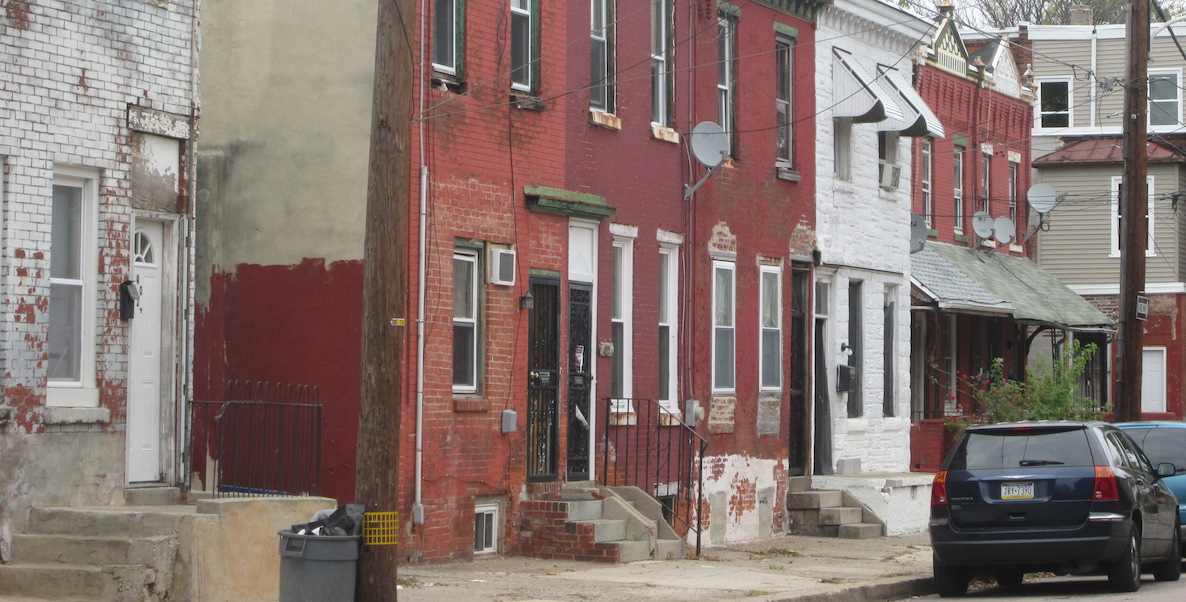A little over two years ago, Allan Domb, having made his fortune in real estate, found himself enrolled in a crash course on the difference between government and the private sector. He’d spent a good part of his fortune—some estimates have it at $1 million—on his election to City Council, and, in conversations with political leaders and governmental workers as a newly elected public official, he would lay out a bold set of goals: “Over the next four years, let’s create 100,000 new jobs, let’s lift 100,000 Philadelphians out of poverty, and let’s bring in 100,000 new residents to the city.”
Sounds like a plan, huh? Something with a timetable and an end goal, something citizens could rally around. Can’t you just see a public campaign organized around such goals? The monthly dashboards charting our progress? The regular press conferences, adjusting and tweaking the means by which we get to an agreed-upon end? Can’t you just anticipate the sense of common purpose that engulfs the city on such a “Yes, We Can” project?
Well, something telling happened when Domb shared his triad of goals with those who work in government: They reacted with trepidation, not excitement. Domb won’t go into details, but he’s told others that his 3-goal platform has usually been met with a word of caution from those inside the bubble of City Hall: “We love what you’re saying. But don’t set goals. It’s not a good idea.”
In Durham, North Carolina, the city publishes an online dashboard of performance measurements—a scorecard, if you will. You can literally click a button and see how your local government is doing at meeting its goals.
Domb didn’t know it at the time, but his instinct to set goals and his willingness to be held publicly accountable aligns with the approach being taken by smart cities throughout the nation. Here, though, his rude awakening to the sausage-making of local politics signals that we have a way to go before we join that rarefied club.
Here, for example, the Mayor recently proposed yet another tax increase in one of the most heavily-taxed cities in the nation. If you’re keeping score, it would be yet another property tax, on the heels of a soda tax, on the heels of a “temporary” sales tax that remains permanent, on the heels of multiple parking taxes, and on the heels of cigarette, liquor-by-the-drink and trash collection taxes, respectively.
This isn’t a supply-side screed against taxes. But wouldn’t it be nice to be told what outcome we’re paying for? Wouldn’t it have helped for Mayor Kenney to say, “Hey, we want to tax sugary drinks to pay for pre-K, which, in 12 years, will result in, say, a 25 percent increase in our high school graduation rate”? Or, more recently: “We want to increase property taxes by 6 percent to fund our schools and we project that, as a result, our test scores will increase by, say, 15 percent over the next four years”?
![]() But setting public policy goals in the People’s Republic of Philadelphia? That runs the risk of holding public officials, who are otherwise in their seats for life, accountable. If Mayor Kenney were a CEO and asking his Board of Directors for an infusion of capital, you can damn well expect the Board to demand from him the return on such an investment. Here, it’s practically unheard of for a mayor to tell his Board of Directors—the voters—what they’re going to get for contributing more of their money to the public coffers.
But setting public policy goals in the People’s Republic of Philadelphia? That runs the risk of holding public officials, who are otherwise in their seats for life, accountable. If Mayor Kenney were a CEO and asking his Board of Directors for an infusion of capital, you can damn well expect the Board to demand from him the return on such an investment. Here, it’s practically unheard of for a mayor to tell his Board of Directors—the voters—what they’re going to get for contributing more of their money to the public coffers.
“In business, before you raise your prices, you look inside and figure out how to make yourself more efficient,” Domb says. “The last thing you want to do is raise your prices because you are afraid of losing customers. In government, the first thing you do is raise taxes. You’re not afraid of losing customers—they have to pay for it.”
There are a lot of excesses worthy of criticism in the private sector—crony capitalism, Ayn Rand-inspired me-firstism—but there’s a long history of capitalism for good, too; as Domb intuited, local government would be well-served to borrow a simple but time-worn approach from the private sector that enhances efficiencies and puts us on a growth trajectory. Think of it: Every Board of Directors demands from its staff a strategic plan, a document that outlines a core mission and a vision for how to get there, something with goals and timetables that serve as a roadmap for holding those in charge accountable. Where’s our strategic plan?
If Mayor Kenney were a CEO and asking his Board of Directors for an infusion of capital, you can damn well expect the Board to demand from him the return on such an investment. Here, it’s practically unheard of for a mayor to tell his Board of Directors—the voters—what they’re going to get for contributing more of their money to the public coffers.
In his annual address to the Chamber of Commerce in February, I scoured the Mayor’s remarks for just such a plan in the form of deliverables upon which we can hold him accountable. But I didn’t hear specific goals and timetables. He has laudably sought local control of the schools—welcoming accountability. But he doesn’t define what success—or failure—would look like. How can we hold him accountable if we don’t hear specific goals—and not goals that we’re already well on the way to attaining?
Before becoming Mayor, Jim Kenney spent 23 years on City Council. He’d never actually run anything before. But other cities are moving away from reflexively feeding the beast of local government—just doing what has always been done—and bringing private sector principles of planning and innovation to the public sphere. In his book, Strategic Planning for Local Government, Dr. Gerald Gordon says that a city’s strategic planning is “a systematic process by which a community anticipates and plans for its future.”
Fort Lauderdale would be exhibit A, where the city’s leaders, stakeholders and citizens embarked on a public process of redefining who they are and what they want to be. Their five-year strategic plan identifies 12 goals, 38 objectives, 191 initiatives and 142 key performance indicators that allow citizens to track the process.
The Mayor’s proposal to hike the property tax again? Not only wasn’t it presented as part of an overall plan, with goals and timetables, but, according to one member of City Council, he didn’t even make the case to them for it. “He just thought he could say, ‘It’s for the kids’ like he did with the soda tax, and we’d fall in line,” Councilwoman Maria Quinones-Sanchez told me.
Then there’s Durham, North Carolina. Once a citywide strategic plan was adopted there, a “goal champion” was named for each goal who meets each week with a Strategic Plan Project Manager to check plan milestones and chart progress. The city publishes an online dashboard of performance measurements—a scorecard, if you will. You can literally click a button and see how your local government is doing at meeting its goals.
Get ready for some breaking news: We don’t do that here, folks. The Mayor’s proposal to hike the property tax again? Not only wasn’t it presented as part of an overall plan, with goals and timetables, but, according to one member of City Council, he didn’t even make the case to them for it. “He just thought he could say, ‘It’s for the kids’ like he did with the soda tax, and we’d fall in line,” Councilwoman Maria Quinones-Sanchez told me.
![]() To its credit, the administration’s recent workforce development plan, Fueling Philadelphia’s Talent Engine, does include a number of goals and calls to measure progress. But many of the goals read like examples of small ball, like raising the high school graduation rate 4 points, from 67 percent to 71 percent by the 2018-19 school year—an increase we were likely headed toward before the release of the report.
To its credit, the administration’s recent workforce development plan, Fueling Philadelphia’s Talent Engine, does include a number of goals and calls to measure progress. But many of the goals read like examples of small ball, like raising the high school graduation rate 4 points, from 67 percent to 71 percent by the 2018-19 school year—an increase we were likely headed toward before the release of the report.
Not coincidentally, like Shared Prosperity, the city’s anti-poverty plan—which was originally released to much fanfare five years ago and has yet to move the needle on our poverty rate—the steering committee of the workforce report is strikingly devoid of private sector CEOs.
That’s in stark contrast to, say, Michael Bloomberg’s mayoralty in New York City, when he literally turned the city’s 1,100 public schools over to an actual CEO—Joel Klein—who embarked upon a strategic plan that saw test scores and graduation rates rise. Can that be the model for change here? Let’s not get crazy. It requires an expertise not often found within local government bureaucracy. Here, to date, Domb is one of very few members of the business class to bring his management know-how to the public sector, and the only one to run for public office.
But let’s not exclusively blame the political establishment for its status quo ways. Business leaders here haven’t stepped up. As Jeremy Nowak has observed, the nominations for the forthcoming School Board did not include bold-face name leaders from the private sector. I’m told that’s not because they weren’t asked; one member of the nominating committee made 54 phone calls to those who could bring some innovative management expertise to the running of our schools. All declined, most citing time constraints.
The truth is, we are a siloed, branch-office town, with a Chamber of Commerce that defers to government leaders and has traditionally shied from agitating for change. In that sense, the Mayor has been encouraged by business leaders to keep right on trucking with his ready, aim, tax policies: If they don’t say, Hold on, where’s the strategic plan for growth…who will?
Photo via Flickr





